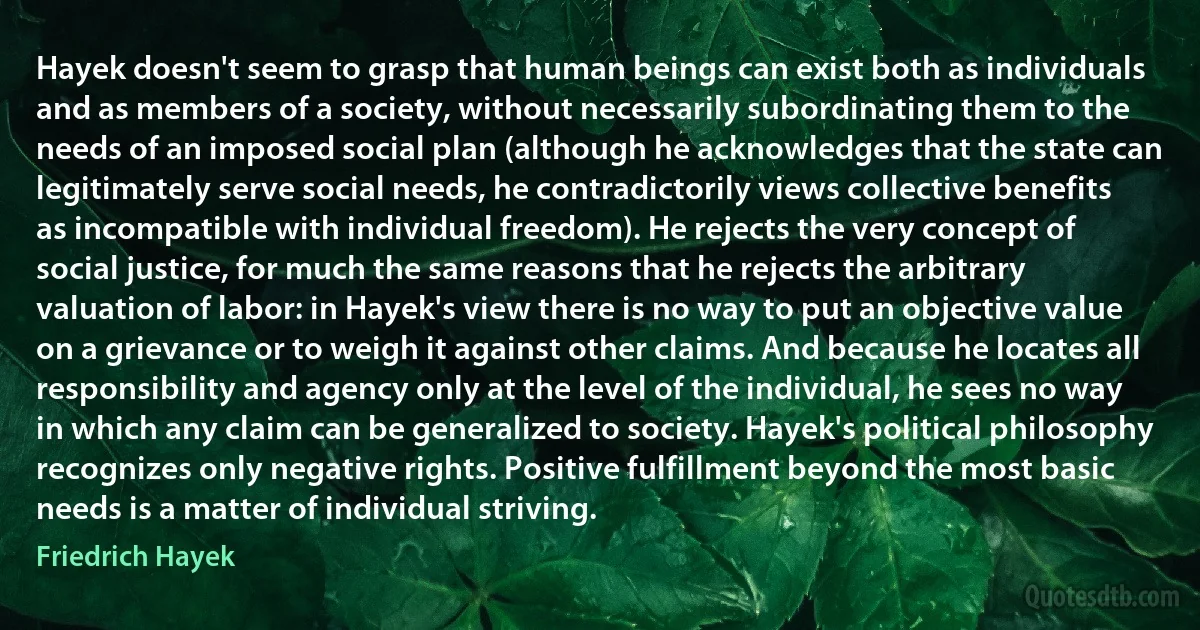
Hayek doesn't seem to grasp that human beings can exist both as individuals and as members of a society, without necessarily subordinating them to the needs of an imposed social plan (although he acknowledges that the state can legitimately serve social needs, he contradictorily views collective benefits as incompatible with individual freedom). He rejects the very concept of social justice, for much the same reasons that he rejects the arbitrary valuation of labor: in Hayek's view there is no way to put an objective value on a grievance or to weigh it against other claims. And because he locates all responsibility and agency only at the level of the individual, he sees no way in which any claim can be generalized to society. Hayek's political philosophy recognizes only negative rights. Positive fulfillment beyond the most basic needs is a matter of individual striving.
Friedrich HayekRelated topics
arbitrary basic beyond claim concept freedom grasp human justice labor matter needs objective plan serve state valuation value view way weigh hayekRelated quotes
It is quite easy to include a weight for empty space in the equations of gravity. Einstein did so in 1917, introducing what came to be known as the cosmological constant into his equations. His motivation was to construct a static model of the universe. To achieve this, he had to introduce a negative mass density for empty space, which just canceled the average positive density due to matter. With zero total density, gravitational forces can be in static equilibrium. Hubble's subsequent discovery of the expansion of the universe, of course, made Einstein's static model universe obsolete. ...The fact is that to this day we do not understand in a deep way why the vacuum doesn't weigh, or (to say the same thing in another way) why the cosmological constant vanishes, or (to say it in yet another way) why Einstein's greatest blunder was a mistake.

Frank Wilczek
In art, origin and value cannot be treated as independent. Those who enjoy poetry and painting must be at least dimly aware of a poet beyond the poem and a painter beyond the picture. If by some unimaginable process works of beauty could be produced by machinery, as a symmetrical colour pattern is produced by a kaleidoscope, we might think them beautiful till we knew their origin, after which we should be rather disposed to describe them as ingenious. And this is not, I think, because we are unable to estimate works of art as they are in themselves, not because we must needs buttress up our opinions by extraneous and irrevelant considerations; but rather because a work of art requires an artist. not merely in the order of natural causation, but as a matter of a-sthetie necessity. It conveys a message which is valueless to the recipient, unless it be understood by the sender. It must be expressive.

Arthur Balfour
The individual, so far as he suffers from his wrongness and criticizes it, is to that extent consciously beyond it, and in at least possible touch with something higher, if anything higher exist. Along with the wrong part there is thus a better part of him, even though it may be but a most helpless germ. With which part he should identify his real being is by no means obvious at this stage; but when stage 2 (the stage of solution or salvation) arrives, the man identifies his real being with the germinal higher part of himself; and does so in the following way. He becomes conscious that this higher part is coterminous and continuous with a more of the same quality, which is operative in the universe outside of him, and which he can keep in working touch with, and in a fashion get on board of and save himself when all his lower being has gone to pieces in the wreck.

William James
[The Kellog Pact is] a mighty moral bulwark against war - and we must never underestimate the effectiveness of moral bulwarks with no bayonet nor bludgeon behind them. The entry of the United States into the Permanent Court of International Justice, the growing confidence in the court, and the increase in the number of nations who have signed the Optional Clause mark definite and, I believe, irrevocable steps in the displacement of military power by judicial process in the settlement of international disputes. Public servants like us will fail in our duty if we do not diminish military power in proportion to the increase of political security...I dare affirm that, in the naval programme of the leading naval powers, there is a margin between real security needs and actual or projected strength, and the world expects this Conference to eliminate that margin.

Ramsay MacDonald
By straying from the text of the Constitution, substantive due process exalts judges at the expense of the People from whom they derive their authority. Petitioners argue that by enshrining the traditional definition of marriage in their State Constitutions through voter-approved amendments, the States have put the issue 'beyond the reach of the normal democratic process'. But the result petitioners seek is far less democratic. They ask nine judges on this Court to enshrine their definition of marriage in the Federal Constitution and thus put it beyond the reach of the normal democratic process for the entire Nation. That a 'bare majority' of this Court is able to grant this wish, wiping out with a stroke of the keyboard the results of the political process in over 30 States, based on a provision that guarantees only 'due process' is but further evidence of the danger of substantive due process.

Clarence Thomas
